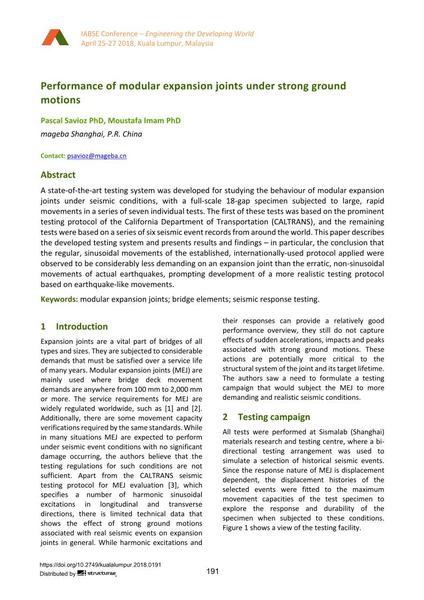Performance of modular expansion joints under strong ground motions

|
|
|||||||||||
Bibliographic Details
| Author(s): |
Pascal Savioz
(mageba Shanghai, P.R. China)
Moustafa Imam (mageba Shanghai, P.R. China) |
||||
|---|---|---|---|---|---|
| Medium: | conference paper | ||||
| Language(s): | English | ||||
| Conference: | IABSE Conference: Engineering the Developing World, Kuala Lumpur, Malaysia, 25-27 April 2018 | ||||
| Published in: | IABSE Conference Kuala Lumpur 2018 | ||||
|
|||||
| Page(s): | 191-198 | ||||
| Total no. of pages: | 8 | ||||
| DOI: | 10.2749/kualalumpur.2018.0191 | ||||
| Abstract: |
A state-of-the-art testing system was developed for studying the behaviour of modular expansion joints under seismic conditions, with a full-scale 18-gap specimen subjected to large, rapid movements in a series of seven individual tests. The first of these tests was based on the prominent testing protocol of the California Department of Transportation (CALTRANS), and the remaining tests were based on a series of six seismic event records from around the world. This paper describes the developed testing system and presents results and findings – in particular, the conclusion that the regular, sinusoidal movements of the established, internationally-used protocol applied were observed to be considerably less demanding on an expansion joint than the erratic, non-sinusoidal movements of actual earthquakes, prompting development of a more realistic testing protocol based on earthquake-like movements. |
||||
| Keywords: |
modular expansion joints bridge elements seismic response testing
|
||||
